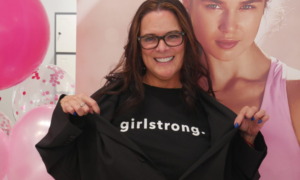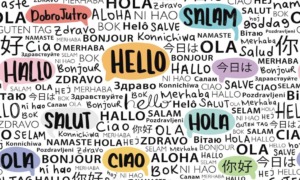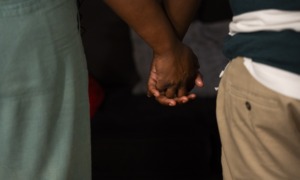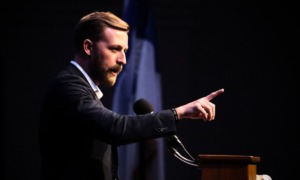My computer’s spell-check function automatically changes “underserved” to “undeserved.” I learned this the hard way, when I had to send a publication back to the presses to correct the mistake, which appeared more than a dozen times.
As I watched hip-hop get-out-the-vote videos the day before last month’s election, I realized that many youth, both urban and rural, believe the country has decided that the word switch is no accident: that underserved youth are, in fact, undeserving.
Speaking in front of a backdrop of substandard houses, dismantled playgrounds and deteriorated schools, African-American youth offered their interpretation of the nation’s chronic underinvestment in their schools and communities. Their conclusion: Politicians don’t believe young people deserve more. Hip-hop artists from Sean “P Diddy” Combs to Eminem flipped the analysis to encourage youth to vote by, in some ways, evoking the code of the streets: “Choose or Lose.” “Vote or Die.” Their message was politicians who disrespect you and your family need to be taken out of office.
Early reports from the Center for Information and Research on Civic Learning and Engagement, based at the University of Maryland, suggest that the message made a difference. Voter turnout hit an all-time high this year. At least 20.9 million Americans under the age of 30 voted, many for the first time. That’s an increase of 4.6 million over the 2000 election.
However, the under-30s remained at about 17 percent of all voters, because of higher turnout among all age groups.
Despite all that was gained this election year, we still have a lot to do to reach the millions of young people who are eligible to vote, but don’t see the point.
Why don’t more youth see voting as a rite of passage? Perhaps because while those of us over the age of 40 lament the bipolarization of America into haves and have-nots, the 24-and-under crowd lives it. True, there are still bootstrap success stories of poor, minority and immigrant youth who “beat the odds.” But the Horatio Alger story isn’t selling the way it used to. Increasingly, young people are either poised to reap the benefits that come with being privileged Americans, or are poisoned by the bitter taste that comes with being chronically underserved, because they are deemed undeserving.
Either way, many may feel that the outcome of national elections has little or no impact on their futures. They feel either invincible or invisible.
The images and words of the young people interviewed in the MTV videos come back to me regularly: “They don’t care about us. … They come to the churches, but are afraid to come in our homes. … No one should have to live like this. … When there isn’t even a chair for you in class, you get the message.”
America’s disconnected youth are disrespected, not only by the general public, but by many of the professionals who serve them but believe they are getting what they deserve. Too many adults believe that these young people don’t deserve to live the American dream because they have cut classes, cursed teachers, used and sold drugs, vandalized buildings, killed and maimed their peers, had children out of wedlock, driven away tourists, carjacked upstanding citizens, and bought clothes and jewelry they couldn’t afford. The last two years have seen a massive resurgence of foundation-supported advocacy for civic education and increased supports for disconnected youth. But these two efforts have not been connected.
This year’s election had the potential to bridge these efforts, not through services, but through young people themselves. We must turn that spark of activism displayed on Nov. 2 into a constant flame that fans out across the country, inviting and engaging young people to come to the table to learn about and discuss policies that affect their daily lives, to share their experiences and to dream about possibilities.
We can’t just connect the services. We need to connect with the young people we hope to serve and to empower them as change-making advocates. One way is to create opportunities for meaningful dialogue between youth who feel stuck on the outside and those in the inner circle.
If we can help them see the value in addressing the things that matter most together, they will begin to change minds and communities.
Karen Pittman is executive director of the Forum for Youth Investment. An expanded version of this column and links to related readings are available at www.forumforyouthinvestment.org.































